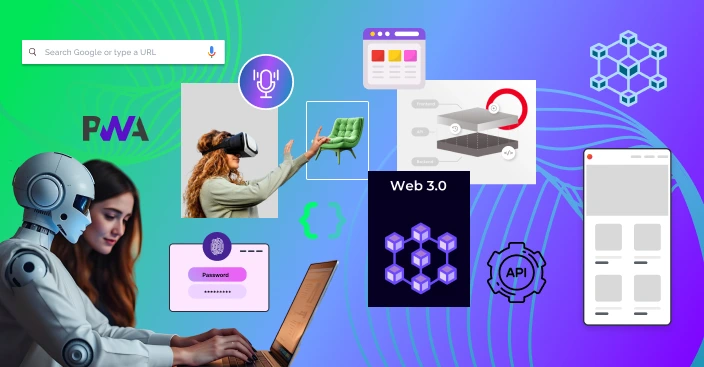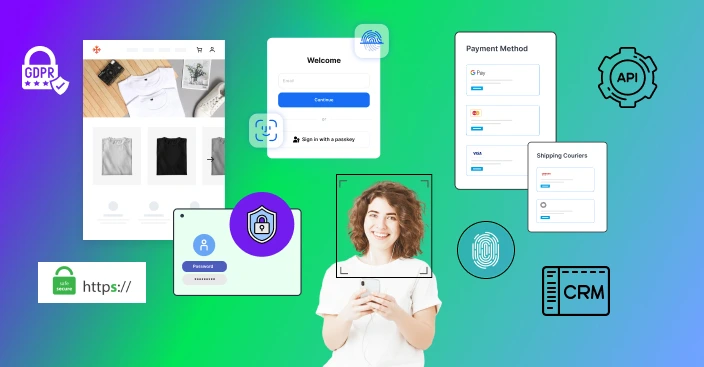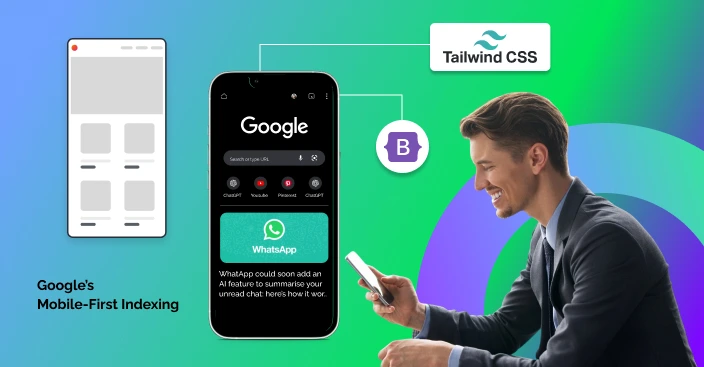Top 13 Web Development Trends in the UK to Keep an Eye on in 2025

Table of Contents
As the UK’s digital industry is changing at a very fast rate, web development technology needs to keep pace with it to remain competitive. With the incorporation of AI, edge computing, immersive experience, and others are changing web designing and web application development in UK are changing in 2025.
UK internet penetration is 90.7% in 2024 and has 63 million active UK users, and will be 91.7% by 2028. Therefore, it is time to pick the best tech support for flawless web development. Below are the best 13 UK trends that UK businesses must watch out for to remain competitive.
Web Development in the UK For Evolving User Expectations
UK businesses are reorienting their web development strategy to address ever-increasing user demands.
This digital omnipresence with old broadband speeds and mobile engagement requires developers to prioritise swift, secure, and mobile-first experiences as the focal point of their strategy.
Successful UK web projects through 2025 will be centred around progressive web apps, voice interaction, and universal design in an effort to reach mass audiences–from digital newbie to mobile-connected buyer.
New websites must maintain smooth, seamless experiences in the new digital world to succeed. Because humans these days love quicker sites and hate fighting bugs. Let’s talk about the most important web development trends needed to make it work.
Explore The Top Web Development Trends For the UK Market
1. Progressive Web Apps (PWAs)
PWAs are revolutionising the UK web experience with app-like performance in a browser. PWAs can be installed, operated offline, launch in a snap, and receive push notifications, unifying the best of web and mobile.
Media and eCommerce companies in the UK are embracing PWAs as an attempt to drive user engagement, lower bounce rates, and realise development cost savings and time. They are a perfect substitute for native mobile apps because they are fast and nimble.
2. AI and Chatbot Personalisation
Artificial intelligence is revolutionising customer interactions on UK websites. From AI-predicted content to intelligent chatbots to provide 24/7 customer care, firms now build deeply personalised user experiences today.
They understand user behaviour and dynamically adapt layout, product recommendations, and messages in real-time.
Customer retention and conversion are boosted through UX based on AI for service and eCommerce websites By reducing the load of work, chatbots enable companies to provide immediate, accurate feedback through social media, websites, and WhatsApp.
3. Platforms with Low-Code and No-Code
Website creation in the UK is becoming easier because to minimal code and no-coding services like Webflow, Wix, and Bubble.. They allow developers and non-developers to build custom web applications at breakneck speeds through visual interfaces.
They are best for MVPs, rapid prototyping, or building in-house tools. They cut time-to-market by an enormous amount and make firms into nimble and cheap entities.
UK startups and SMEs increasingly employ such platforms to run iterations quickly with little investment in coding talent.
4. Serverless Architecture
Serverless computing, powered by the likes of AWS Lambda, Azure Functions, and Google Cloud Functions, is in high demand among British developers.
It enables organisations to focus solely on code logic while allowing server provisioning and scaling to be left to the cloud provider. The trend excels in creating event-driven, scalable applications with a lower cost of operation.
It is well-suited for microservices, real-time data processing, and applications with atypical usage patterns. Serverless architecture enables deployment within a matter of minutes and reduces overheads, which makes it extremely popular among UK technology companies.
5. Micro-Frontends and Designing with APIs first
Numerous teams can create, test, and launch separate components of a web interface independently with the help of micro-frontend framework.
By utilising the API-first design integration, the module-based architecture supports higher scalability and flexibility. UK businesses employ it to enhance the development cycle and support more collaboration between teams.
The architecture also takes into account easy maintenance, code reuse, and easy third-party integration. It is very convenient for large applications where one team is working on another batch of features, and quick updates are possible without impacting the entire platform.
6. Voice Search & Conversational UI Optimised
With more than 50% of total searches being voice searches, UK companies are making their digital content voice-friendly.
Natural language-conversational UIs allow individuals to talk to websites. Voice optimisation includes data retention for rich snippets, FAQs optimisation, and integrating NLP-based chatbots.

The technique is vital in business sectors such as eCommerce, health, and tourism, where users need instant, hands-free communication. Voice optimisation increases accessibility and usability and therefore makes websites accessible.
7. Exploring AR/VR & 3D Experiences
Virtual reality (VR), augmented reality (AR), and 3D technology such as WebGL are improving the UK web browsers’ experience. Virtual product demonstrations, home tours, and interactive simulations are offered in the browser by organisations.
They enhance decision-making with natural interaction, particularly in furniture, property, fashion, and motor sectors. Integrating immersive graphics enables the brands to differentiate, enhance dwell time, and minimise returns. UK brands utilise such technologies to deliver engaging, next-generation digital experiences.
8. Accessible and Sustainable Design
Accessibility and sustainability are no longer choices for UK sites, they’re necessities.
Developers are embracing green hosting, lean code, and power-saving design practices such as dark mode.
In parallel, accessibility principles (WCAG) are being adopted so that websites are accessible to everyone, including the disabled. Screen-reader support, alt text descriptions, keyboard accessibility, and contrast optimisation are now best practices.
With Environmental, Social, Governance policies going mainstream, UK companies are making their web presence green and inclusive.
9. WebAssembly (Wasm)
By executing coded languages like C, C++, or Rust within the browser at almost native rates, WebAssembly (Wasm) enables quick online apps. It is used by programmers in the UK to create powerful applications like live editors, representation tools, and activities.
Wasm lowers application runtime and boosts cross-browser interaction to provide smooth, secure experiences without depending entirely on JavaScript.
UK companies can thus provide rich browser applications without giving up performance or user experience.
10. Edge Computing & Real-Time Interactions
Edge computing is calculation nearer to the user than distant servers, reducing latency and maximising response time. UK companies are adopting edge solutions to facilitate real-time capability such as live chat, share prices, video conferencing, and health monitoring.
It is especially crucial for financial services, retail, and health. UK web solutions can enjoy higher uptime, security, and faster interactions by adopting edge computing, leading to sleeker, low-latency user experiences across the board.
11. Motion UI & Micro-Interactions
Micro-interactions like hover effects, animated buttons, and subtle feedback animations are contributing to more intuitive and interactive UK websites.
Motion UI guides can be a best options for the user to interact without interfering by offering visual cues and dimension.
It will help to produce a more seamless and engaging user experience. Additionally, they are also useful for boosting the accessibility and marketing, partricularly for the eCommerce websites and apps.
Movement is being applied with intentional purpose to shock consumers and turn browsers into buyers through the facilitation of latent design as an interactive experience by UK designers.

12. Web3 & Blockchain Integration
Web3 technologies are revolutionising web development by potentially making it possible to utilise decentralised apps (DApps), blockchain authentication, and secure transactions.
UK innovators, in the form of fintech and legal tech, are looking to Ethereum, NFTs, and smart contracts to instil trust and integrity into digital engagements.
Examples are identity verification to authenticate transactions and tokenisation of assets. Decentralisation eliminates middlemen and introduces security. As UK consumers grow more privacy-conscientious, Web3 adoption surges, and the next generation of innovation on the web is promised.
13. New Age Security & Compliance
With ever-increasing sophisticated cyber attacks being built, web development in the UK needs to be security and compliance-oriented.
With the help of a basic secure features the brands can get better authentication. Get fingerprint sign-on, encrypt your data, and ensure continuous security scanning.
It will help your brands to manage the sensitive customer data aligned with the legal regulations like General Data Protection Regulations and similar legal factors like this.
UK developers are embedding software that constantly scans for threats and automatically fixes vulnerabilities. Security is not an afterthought add-on, it’s an integrated component woven in and through web development.
Conclusion
The UK web development environment is changing at lightning speed, and businesses are embracing innovation to stay ahead and deliver what the user wants.
From AR/VR and 3D graphics to accessible and green design, companies are extending what is possible on the internet.
Blockchain, AI, and serverless architectures are requirements for safety, scaling, and productivity; they are not options.
These developments enable UK businesses to produce superior, quick, and engaging online experiences that encourage expansion and client engagement. Connect with a web development experts for implemntaing and knowing about these trends.
FAQs
 What are the top web development trends UK companies should know?
What are the top web development trends UK companies should know?
UK businesses need to have PWAs, AI personalisation, mobile-first responsive web development, edge computing, serverless architecture, motion UI, headless CMS, and advanced security measures at the top of their agendas. These technologies are offering top-of-the-class performance, user experience, scalability, and compliance in 2025.
 How does Magneto allow websites to scale for businesses that are growing fast?
How does Magneto allow websites to scale for businesses that are growing fast?
Magneto is holding 14+ years of experience in web development, with expertise in Adobe Commerce, Magento, Salesforce, Odoo, BigCommerce and lots more we are the leading experts for the UK market. Connecting with Magneto can be beneficial for implementing the right technology and platform to boost your eCommerce business success.
 Why mobile-first design is so vital to UK businesses in 2025?
Why mobile-first design is so vital to UK businesses in 2025?
Because over 60% of traffic in the UK is mobile-first. User experience is improved by responsive design, instant loading through PWAs, and thumb navigation, reducing bounce rates and maximising mobile store and web app conversion.
 What are web applications in-store?
What are web applications in-store?
The next web applications will be more intelligent, interactive, and decentralised. Watch for AI-powered assistants, edge computing with real-time data, AR/VR interactive experiences.
personalised content and voice-based control with end-to-end experience, all built on scalable, serverless architecture and composable frontends.
 Is edge computing right to construct new web applications?
Is edge computing right to construct new web applications?
In practice. Edge computing reduces latency, accelerates response time, and increases reliability, especially beneficial for real-time data handling, IoT, and high-performance web services. UK companies are embracing edge solutions in fintech, retail, and healthcare to deliver better user experience.
 How much does it cost to develop a web application in the UK?
How much does it cost to develop a web application in the UK?
Development costs are hugely dependent on complexity, amount of custom features, integrations, hosting needs, and compliance needs. A low-end PWA or SPA would begin at £20,000–£50,000; however, the advanced one will take much time. Connect with our team to request a custom quote depending on your project size.



